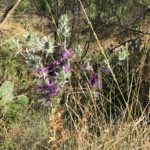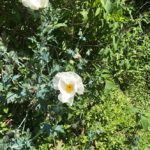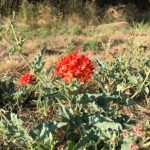The Soil and Water Sciences Department is offering students the chance to blog about their summer experience. The students enrolled in one of three courses over the summer, for which they received credit: SWS 4905-Individual Work, SWS 4911-Supervised Research in Soil and Water Science, and SWS 4941 Practical Work Experience. This is Sam Glinsky’s summer experience:
My name is Sam Glinsky and I’m studying Environmental Management in Agriculture and Natural Resources. This summer, I worked for the Texas Department of Transportation. As a vegetation specialist intern for TxDOT, I worked on many different projects.
Scope of Work
Vegetation specialists are in charge of TxDOT’s herbicide program and other areas related to safety and beautification on state right-of-ways. One of the largest projects I assisted with was our herbicide testing program. We test products for 3-5 years before they are rolled out across our 25 districts with more than 1500 licensed herbicide operators. This testing program allows us to determine which products are safe, cost-effective and will have minimal environmental impacts when used properly.
Another project I worked on was our wildflower program. Texas is known for its wildflowers and any wildflowers seen along state roads and highways can be attributed to this team. In this program, I helped create a wildflower guide. This guide had pictures of wildflowers, weeds, and grasses so herbicide operators can identify plants they see in the field. This guide is very easy to read and user-friendly. That allows us to give copies to the public as well.
One-of-a-Kind Experience
The experience was amazing! For our herbicide testing program, we travel up to 75% of the time. This means I saw many different areas of Texas. The ecological diversity and hidden gems across the state were mind-blowing. I was able to have fun in this position, which is hard to say about many jobs, but it also set me up for a potential career with TxDOT.
One skill I developed was plant identification. I can now identify more than 50 Texas natives and this number is growing by the day. Another skill I developed was how to be a herbicide operator. I passed the herbicide operator exam administered by TxDOT. I then assisted with establishing herbicide test plots across the state.
Application of Knowledge
My previous coursework was crucial for this job. Two major concepts that really assisted with my success in this position were plant biology and soil science. I began learning these topics at my previous university but developed them further at UF. The combination of these two disciplines encompasses a large portion of what I did. Whether it was erosion control assessments or determining proper environmental conditions for spraying herbicide, I was prepared.
This field of work faces a major challenge: the invasive species Johnsongrass (Sorghum halepense). This invasive does incredibly well in the Texas climate and is established across the state. It is very hard to kill and requires persistent treatments to eradicate it. If mowed, it will outcompete any native grasses. It is an extremely hardy species and grows very tall. Due to the genetic modifications of corn-like crops (also Sorghum species), it easily develops resistance to herbicides. As far as right-of-way beautification and safety goes, this is currently the biggest problem in Texas.
 0
0




